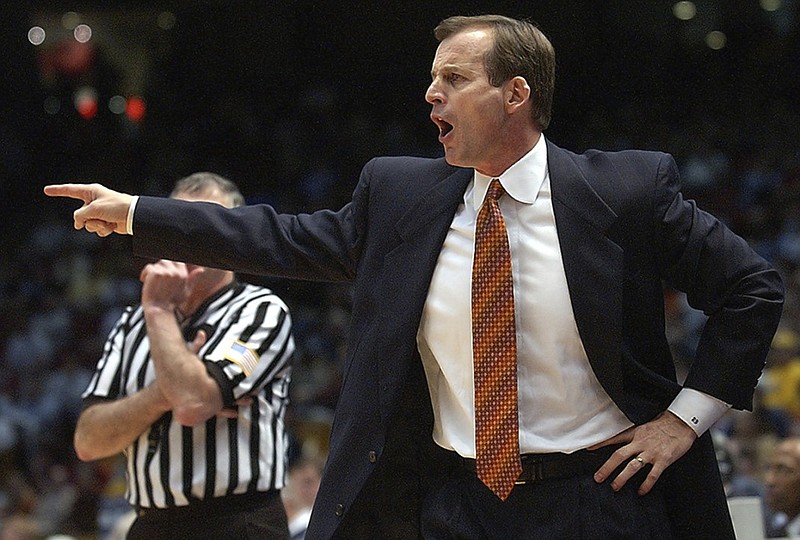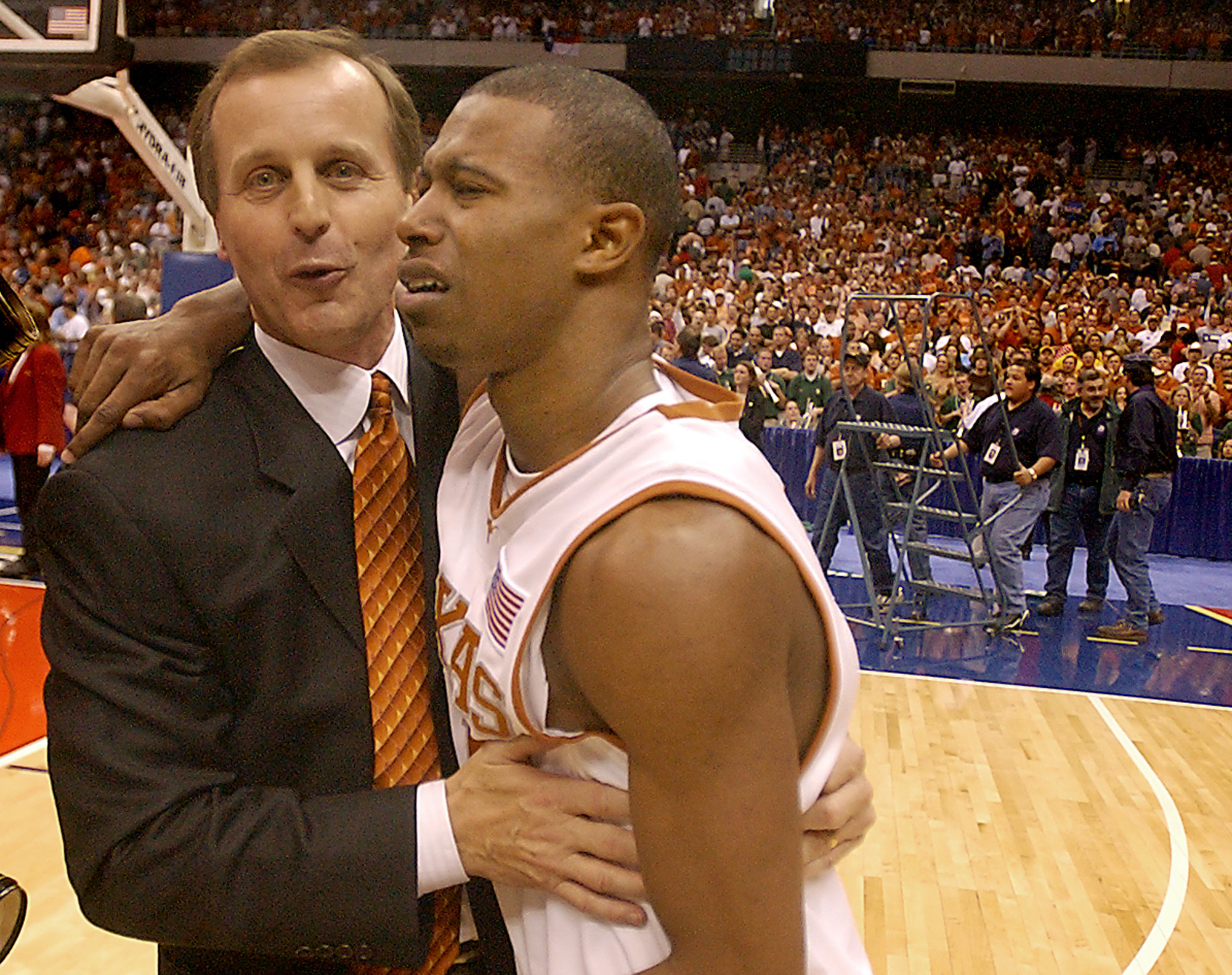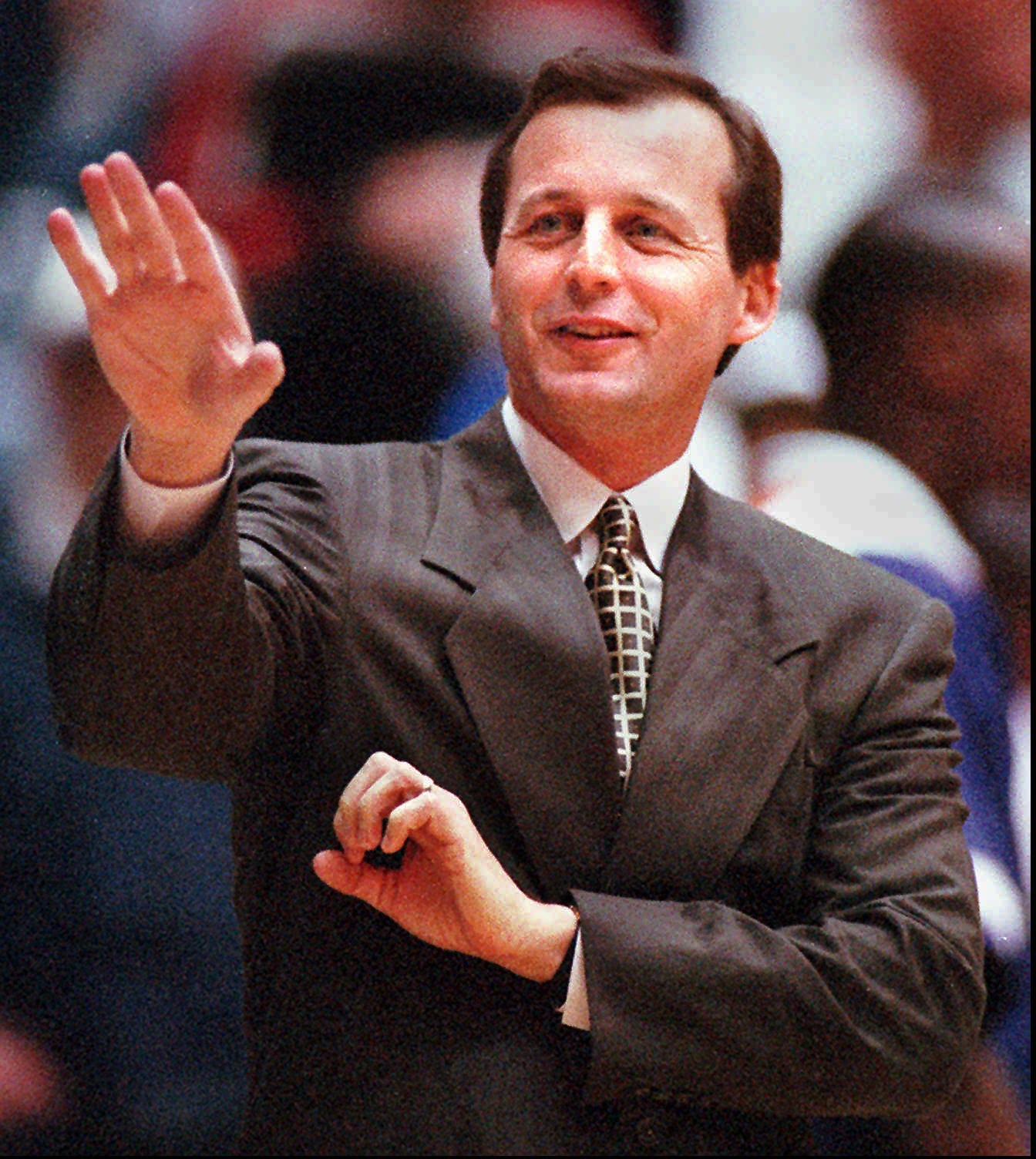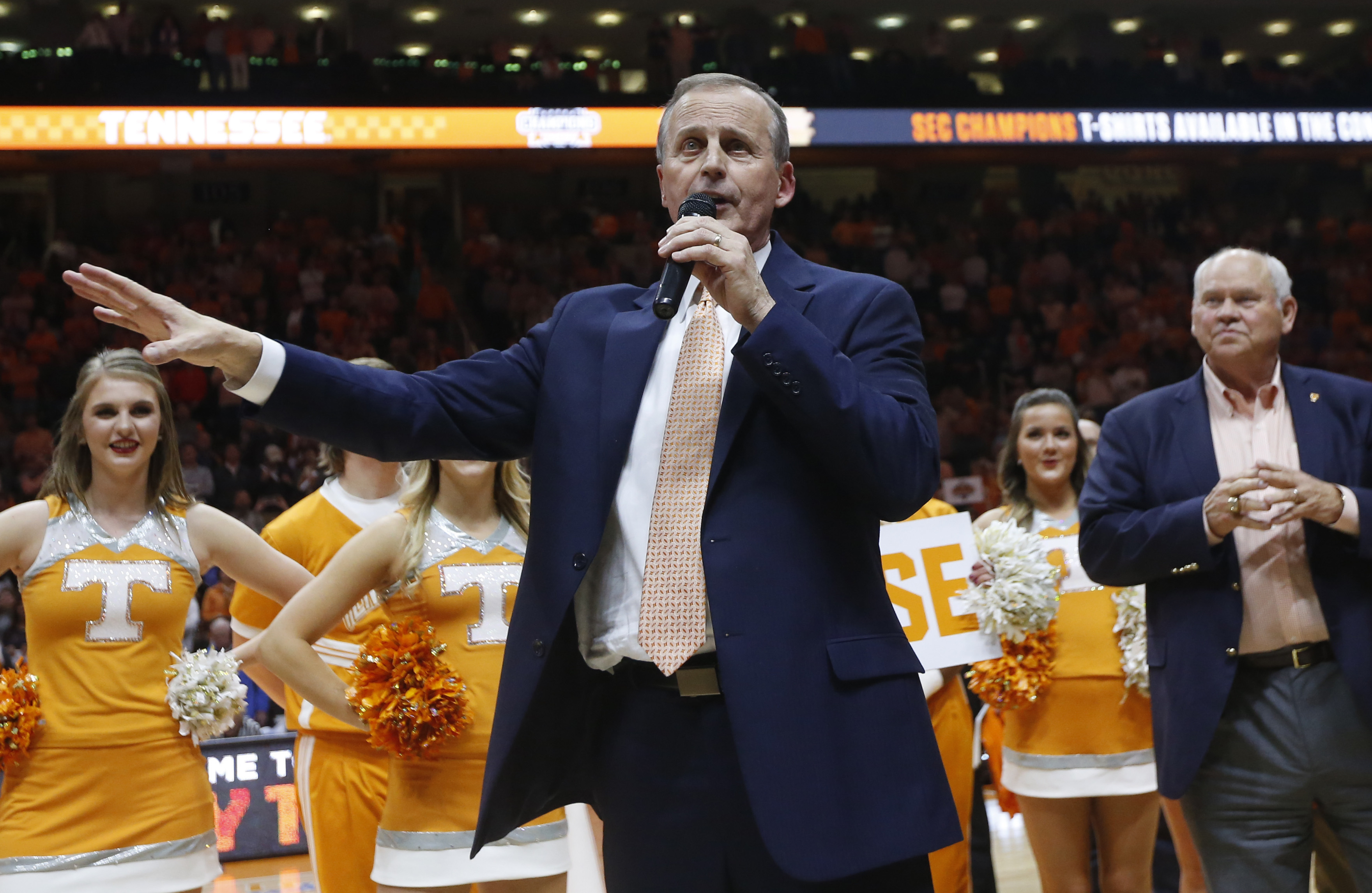 Tennessee men's basketball coach Rick Barnes has the Vols in the NCAA tournament for the first time in his three seasons in Knoxville. But Tennessee is the fourth program he has taken to the Big Dance. The Vols play Wright State at 12:40 p.m. EDT today in Dallas. (Staff Illustration by Mark Wiedmer/Times Free Press)
Tennessee men's basketball coach Rick Barnes has the Vols in the NCAA tournament for the first time in his three seasons in Knoxville. But Tennessee is the fourth program he has taken to the Big Dance. The Vols play Wright State at 12:40 p.m. EDT today in Dallas. (Staff Illustration by Mark Wiedmer/Times Free Press)
DALLAS - Sitting at his desk, which is really just a table next to the court at Tennessee's basketball practice facility in Knoxville, Volunteers coach Rick Barnes is getting to the part of the story where he lists all the different assistant coaching jobs he applied for in the mid-1980s.
Suddenly, a voice begins to rise above the sounds of squeaking sneakers and bouncing basketballs.
Barnes identifies his iPad as the source of the phantom voice, and as he scrambles to silence the disruption, he explains, "I listen to a bunch of preachers."
"This is Albert Mohler right here today," Barnes says as he presses pause on the evangelical theologian's message.
Back on task, Barnes begins rattling off the names. He landed interviews for assistant coaching positions with legendary Duke coach Mike Krzyzewski, Gary Williams at Boston College, Bill Foster at Clemson and others before he broke through.
"As a young guy, I would apply for every job just out of being naive," Barnes said.
In 1985, at age 31, Barnes was five years into his time as an assistant at George Mason and had yet to be part of an NCAA tournament.
Finally, with the help of his boss, Barnes landed another interview. This one was to be an assistant under Wimp Sanderson at Alabama. Barnes got the job and helped the Crimson Tide reach the Sweet 16 in 1986.
 Rick Barnes shouts to an official during the 2003 NCAA men's basketball tournament. Barnes was the coach at Texas at the time, and he led the Longhorns to the program's first Final Four appearance. Now he is in his third season as coach at Tennessee, and the Vols will play their NCAA tourney opener today against Wright State in Dallas. (Photo: Rodolfo Gonzalez/American Statesman)
Rick Barnes shouts to an official during the 2003 NCAA men's basketball tournament. Barnes was the coach at Texas at the time, and he led the Longhorns to the program's first Final Four appearance. Now he is in his third season as coach at Tennessee, and the Vols will play their NCAA tourney opener today against Wright State in Dallas. (Photo: Rodolfo Gonzalez/American Statesman)NCAA tournaments have been a regular part of Barnes' career ever since.
When No. 3 seed Tennessee (25-8) plays its 2018 NCAA tournament opener against No. 14 seed Wright State (25-9) at 12:40 p.m. EDT Thursday at the American Airlines Center in Dallas, Barnes will be coaching in his 25th Big Dance, 23 of them as a head coach.
At 63, Barnes is the Southeastern Conference coach of the year, a candidate for national coach of the year and just the 13th coach to ever lead four programs to the NCAA men's basketball tournament.
Those facts about Barnes are likely to be repeated on TV broadcasts during Tennessee's time in the NCAA tournament as analysts marvel over how Barnes has revitalized the program and his career in his third season with the Vols, who shared the SEC regular-season title with Auburn.
But nobody should be surprised by any of this. Barnes has been resurrecting moribund programs his entire career. T.J. Ford, a former star point guard for Barnes during his time at Texas, certainly isn't.
"Number one, I think you've got to look at his history," Ford said. "He's known for going to programs and turning them around. He's been pretty much 100 percent at turning any program he's been in around, no matter what the situation is, no matter what the talent is. He loves to start from scratch and build something up. He's pretty much proven that he's good at taking something, assessing it and making it better. So what's going on at Tennessee? I'm not surprised.
"He did it everywhere he's been, from Providence to Clemson, to Texas to now at Tennessee."
But the message Barnes would rather convey is that his career is not about him. Instead, Barnes credits everyone who gave him a chance throughout his career's winding path, and he credits his faith, which is so deeply ingrained in who he is that sometimes the evidence of it flows unprovoked from his iPad speaker.
"I believe God is in control of everything," Barnes said, "and I think he brings peoples' lives together for a reason."
___
Soon after his first NCAA tournament experience at Alabama ended, Barnes left Sanderson's staff to work for Williams, who was taking the head coaching job at Ohio State.
Barnes' one season with the Buckeyes offered a blueprint that will sound familiar to Tennessee fans. A team picked to finish next-to-last in its conference embraced a blue-collar mentality and scrapped its way past meager expectations to make the 1987 NCAA tournament. Once there, Ohio State defeated Kentucky behind a 32-point performance from Dennis Hopson.
"You know what I remember about Coach Barnes is his voice, man," said Hopson, now 52 and the director of basketball operations for the YMCA in Toledo, Ohio. "He has that country accent. I used to laugh at him about it."
Barnes and Hopson reconnected this year because of Hopson's relationship with Chris Darrington, a Toledo native Barnes recruited to join the Vols as a junior college transfer.
Barnes' two seasons as an assistant at high-major programs are a distant blip on his coaching résumé now, but those teams - particularly the head coaches and the introduction they gave him to the NCAA tournament - made a lasting impact.
"Those two guys (Sanderson and Williams), we run parts of their offense today," Barnes said. "We run a set that I picked up at Alabama that I've run every year I've been a coach. This year with this group, I went in and put in a couple things I learned with Coach Williams that he ran. We run them, and really, it's our two things that we normally go to."
Hopson recalled Barnes being a fiery assistant on an ambitious staff. Williams went on to win the national championship as head coach at Maryland in 2002.
"When you're under a good teacher like Gary Williams, it doesn't surprise me to see what Rick Barnes is doing as a good coach, because he's been around good people," Hopson said. "Being around the right people works wonders."
___
After his stop at Ohio State, Barnes got his first head coaching job back at George Mason. The Patriots fell one game short of the 1988 NCAA field by losing in the conference tournament final. Still, the job Barnes did drew some attention, and after one year at George Mason, he was hired at Providence.
There, he guided a program that had been to one NCAA tournament in the previous 10 years to three in six years. The Friars punched above their weight in a loaded Big East, and Barnes succeeded in an area of the country where his dialect seemed even more foreign than it had in Ohio.
"The accent would be a little funny, the twang," said Rob Phelps, a player Barnes recruited out of New York City and coached for four years at Providence. "But he knew basketball, and that's all that really mattered to me anyway."
As Barnes was looking ahead to the SEC tournament earlier this month, he recalled Phelps' 10-of-11 shooting performance in the 1994 Big East semifinals. Phelps' big game helped Providence beat top-seeded Connecticut, which was ranked No. 2 nationally. The next day, Providence won its first Big East tournament title.
This is another junction where Barnes' journey intersects with the present.
That year he learned how challenging it can be to play for a conference title on Sunday, then have to play an NCAA tournament game on Thursday, which is what the Vols will do against Wright State after losing 77-72 to Kentucky in Sunday'sSEC final in St. Louis.
"We got back into Providence, and everyone was just so excited about the guys, which they should be," Barnes said. "But then we had that quick turnaround, and we didn't play well. We got beat in the first round."
Eyeing a chance to get his family closer to its North Carolina roots, Barnes accepted the job at Clemson after that season and started a habit of turning Southern football schools that wear orange into basketball winners.
Barnes left Providence, which had gone 11-17 the year before his arrival, with an 108-76 record in his six seasons there. Phelps, who is now a high school administrator and the head coach at Bedford Academy in New York, credited Barnes with reviving the Friars.
"Now looking back at it, everything that he's taught us has come into play, not only on the basketball court but in life," Phelps said. "Coach Barnes was going to be hard on us and really strict, but he wanted the best for us."
___
Off the court, Barnes is known for his practical jokes and easygoing nature. His demeanor on the practice court and his handling of conditioning drills offer a stark contrast. He was so hard on his first Clemson team that just five scholarship players remained by the time the season started.
The "Slab Five," as the group was known, led Clemson to a No. 18 national ranking. Much like Barnes' first two teams at Tennessee, the 1994-95 Tigers overachieved initially but struggled late in the year and missed the NCAA tournament.
His final three teams at Clemson all qualified for the Big Dance. Only four teams in program history had been to the NCAA tournament before Barnes arrived, and none went for nine years after Barnes left for Texas.
Barnes relished what others might have viewed as a dead-end job, and he still smirks as he recalls being told his first Clemson team would be the worst in Atlantic Coast Conference history.
"He thrives in that," said Terrell McIntyre, who was Clemson's point guard under Barnes from 1995 to '98. "If you see the previous stops where he's been, he's turned everywhere he's been around and gotten them to the tournament. It's because of his demanding style of coaching and his toughness. He's a competitor and he instills that in his players, especially his Providence days, his Clemson days, his Tennessee days, the early days at Texas.
"They're tough, hard-nosed teams."
When Barnes talks about the players, such as McIntyre, who helped the Tigers reach three straight NCAA tournaments, his eyes light up.
"It was guys that were recruited but not overly recruited," Barnes said as he motioned toward Tennessee's practice court, where junior forward Admiral Schofield was dripping sweat from a voluntary shooting drill. "Like this group."
McIntyre is back at Clemson as the Tigers' director of player development and keeps in touch with Barnes. Time healed the wounds McIntyre felt when Barnes left Clemson for Texas after the 1997-98 season, which was McIntyre's junior year.
"The older you get, you understand he did what's best for him and his family," McIntyre said. "Just like when guys go to a professional level, they want to do what they can to be at the top, and going to Texas was a bigger stage for him because he was trying to get himself to compete for a national championship."
___
Of all his memories from the 2002-03 Texas team that made the Final Four, the one that came to mind first for Barnes as he reflected on that team earlier this month occurred at the end of the Longhorns' 85-76 Elite Eight victory over Michigan State in San Antonio's Alamodome.
Barnes estimates that all but 2,000 of the 30,169 attending the game were Texas fans eager to see the program reach its first Final Four in the modern NCAA tournament era.
The moment was unparalleled in Longhorns basketball history, and as the final seconds ticked off the clock, Ford - the star point guard - embraced Barnes before the coach had the chance to shake hands with Michigan State coach Tom Izzo.
"He got me in a bear hug, and he looked at me and he said, 'Coach, we're going to the Final Four,'" Barnes said. "Tom Izzo stood there very classy and just waited. T.J. wouldn't let me go, and he stood there, and that's what I remember about that game. Tom was standing there, which is hard to do when you lose anytime."
The Longhorns made the NCAA tournament 16 of his 17 years at Texas. The program's ability to recruit high-profile players picked up after Ford won the Naismith Trophy as college basketball's best player in 2003 and became the eighth overall pick in the NBA draft.
Kevin Durant and LaMarcus Aldridge played for Barnes at Texas before becoming NBA stars, but Barnes is quick to offer a clarification.
"People act like the whole time we were at Texas that we always coached five-star guys or they think of Kevin Durant," Barnes said. "That wasn't what built our program."
He motioned toward the Tennessee practice court again, where Schofield had moved on from jump shots and was working on his finesse game in the paint.
"It goes back to the assistant coaches," Barnes said. "They knew how we wanted to run our program, and they did look for certain kind of kids - tough, hard-nosed, blue-collar kind of guys that wanted to be in the gym."
Momentum tapered off toward the end of Barnes' time at Texas. In 2013, the Longhorns missed the NCAA tournament for the first time in his tenure. His last game with them was a loss to Butler in the opening round of the 2015 NCAA tournament.
Officials at Texas wanted Barnes to make changes to his staff.
"I couldn't do that," Barnes told ESPN at the time. "That would be me saying this is about me. I've been carried by a lot of people here. We're in this together."
So in an emotional farewell news conference, Barnes expressed gratitude for his time at Texas. Two days later, he was introduced at Tennessee on the heels of the unceremonious ending to the one-year Donnie Tyndall era, which followed Cuonzo Martin's abrupt exit.
Barnes grinned at a roster other coaches would have grimaced at and got back to work. He'd done this before.
As the Vols take the court in Dallas on Thursday, Barnes will apply a lesson he learned from the man who finally took a chance on him and gave him his first high-major assistant coaching job in 1985. At Alabama, Barnes remembers Sanderson emphasizing how participating in the NCAA tournament should not be taken for granted.
"Well, I thank God for the opportunities he's given me," Barnes said. I've been at some wonderful universities with some great administrators and been blessed, truly, with some terrific basketball players. Great coaches have been with me every step of the way.
"I just thank God. Coming to Tennessee has been a blessing."
Contact David Cobb at dcobb@timesfreepress.com. Follow him on Twitter @DavidWCobb and on Facebook at facebook.com/volsupdate.



